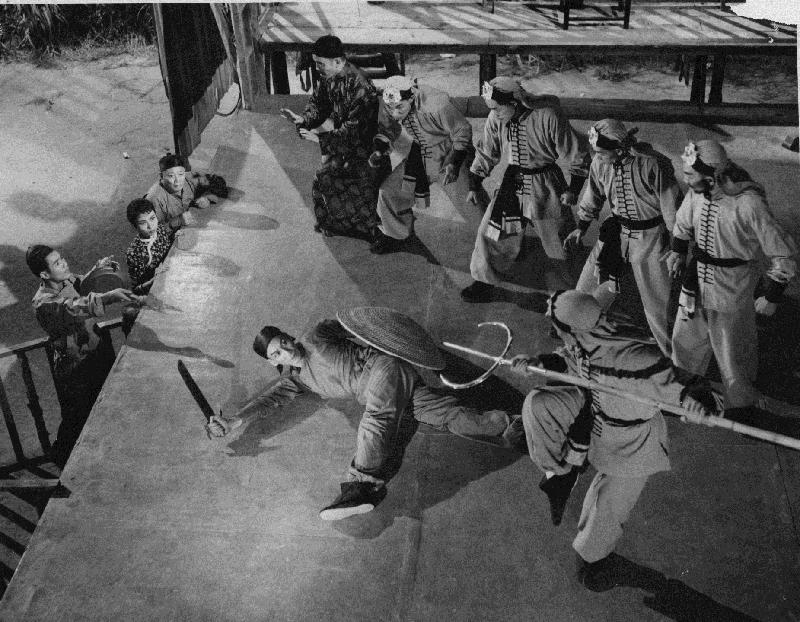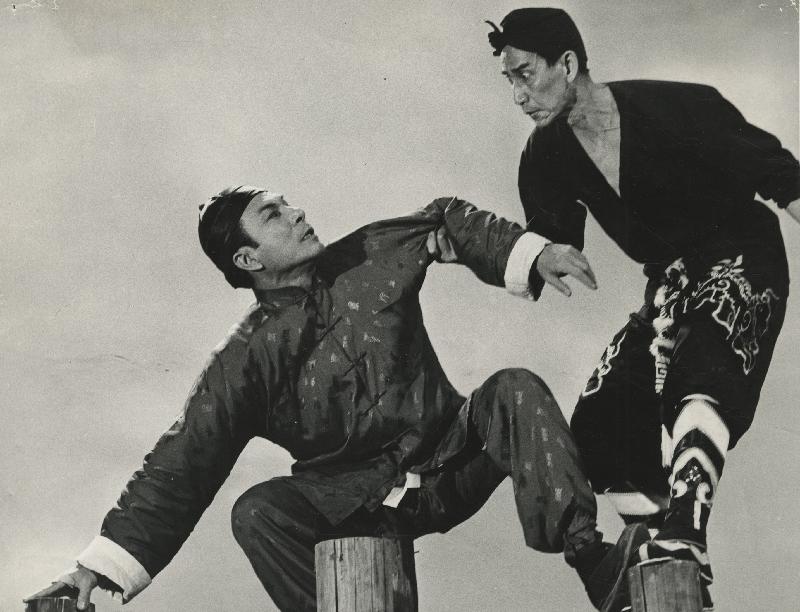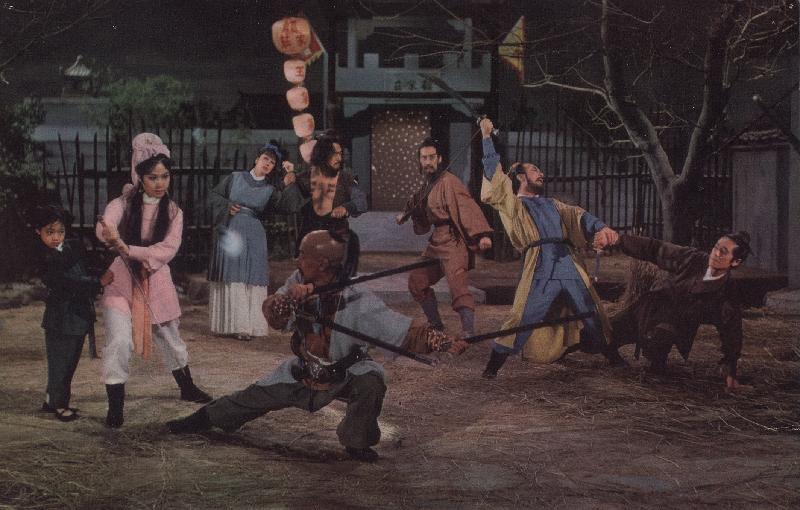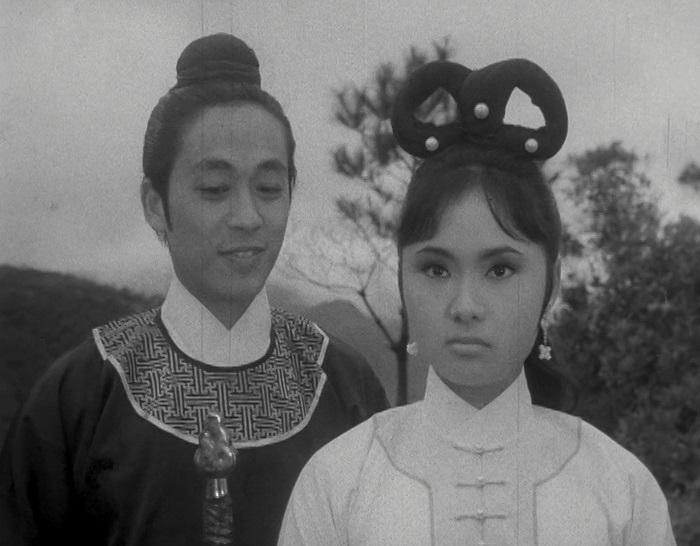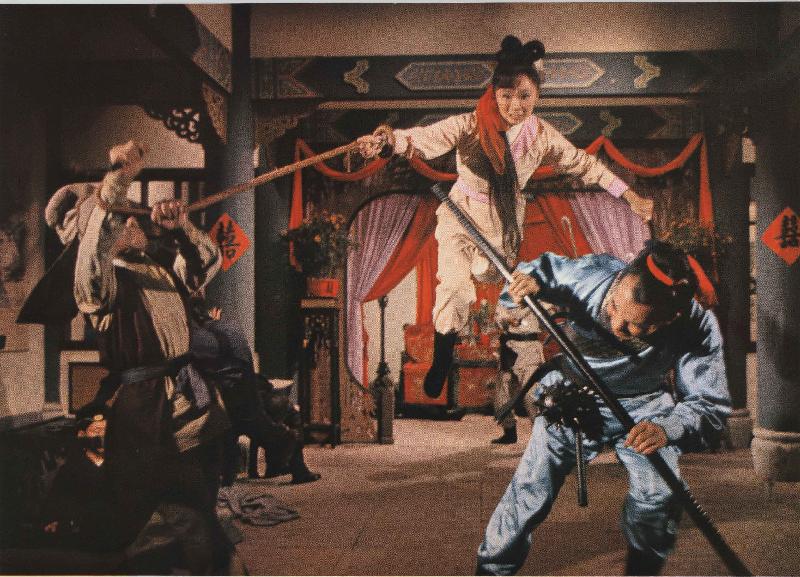Film Archive's "Morning Matinee" to feature iconic martial arts duos (with photos)
**********************************************************************************
In the 1950s, Wong Fei-hung, played by Kwan Tak-hing, and his nemesis 'Villain Kin', played by Sek Kin, formed a classic duo in the Master Wong film saga. In "How Wong Fei-hung Subdued the Two Tigers" (1956), both are seriously wounded after a face-off. Kwan is then determined to train hard to find a new winning move in order to claim victory. Produced by Kwan, "Wong Fei-Hung's Battle with the Five Tigers in the Boxing Ring" (1958) features Master Wong assisting the border generals against Villain Kin and other martial arts masters. The fighting scenes include not only hand-to-hand combat but also stunning scenes using assorted weaponry. The duel between Sek and Kwan is the highlight in "Wong Fei-hung: The Invincible Lion Dancer" (1968), in which Sek attacks fiercely with double sabres in his hands while Kwan skilfully confuses him by using feinting moves, showing his acting talent as well. "The Mystical Whip-wielding Hero" (1968) showcases the duo's on-screen feud beyond the Wong Fei-hung film series.
Suet Nei, agile in action and with a face reflecting sweetness and steely courage, and the urbane-looking Kenneth Tsang Kong with his charming swagger, made arguably the best action partners in 1960s Cantonese cinema. Starring as wuxia masters in "The Green-Eyed Lady" (1967), the duo chase their common enemy together. Suet thinks herself invincible but Tsang's secret helping hand saves her. In "The Black Musketeer, Part Three" (1967), the dark heroine Muk Lan-fa, played by Suet, pairs up with Tsang to fight against the Judo Master and ruin the criminal gang's treasure-hunting scheme. "Three Heroines, Part One" (1968) features Tsang as the swordsman who is rescued by Suet, the White Phoenix. Tsang then meets the Red and Black Phoenix and together they destroy the evil Skeleton Sect. In "Three Heroines, Part Two" (1968), the swordsman and the three Phoenix fight against their new enemy. Designed by action choreographers Tong Kai and Lau Kar-leung, the action sequences in the two series are refreshingly innovative. In her last film before getting married, "A Mysterious Weapon" (1969), Suet successfully proves her senior fellow's innocence using her signature "iron hair move" and helps Tsang take revenge on the villain.
Ti Lung and John Chiang, with their distinctive charisma and charm, stand out as the most successful duo of director Chang Cheh’s staunchly masculine cinematic world of the 70s. "The Anonymous Heroes" (1971) tells the story of a pair of small-time crooks played by the duo who become patriotic after meeting a rebel group, and they fight both mentally and physically with the warlord. In "Duel of Fists" (1971), Ti and Chiang are half siblings. Ti, a Thai boxer, and Chiang, a Chinese martial artist, jointly fight against the triad boss. Unlike the usual casting of action duos, Ti and Chiang are portrayed as mortal enemies in "The Blood Brothers" (1973), in which Ti, the eldest brother, kills the second brother and takes his wife, while Chiang, the youngest brother, decides to take revenge. The film earned Ti the Best Actor Award at the Asia Pacific Film Festival 1973. In "The Savage Five" (1974), the duo lead Chan Koon-tai, Wong Chung and Danny Lee to rebel against bandits in a gruesome battle to help villagers.
In the 80s, brothers-in-arms Sammo Hung and Yuen Biao, who were members of the 'Seven Little Fortunes' trained by Yu Zhanyuan, collaborated frequently and helped create the genre of Hong Kong action comedies. "Knockabout" (1979) is Hung's tailor-made work for Yuen and features his fantastic somersaults, flips and rhythmic fighting, proving Yuen's mettle as a leading star. "The Prodigal Son" (1981) tells the story of the apprenticeship of wing chun hero Leung Jan, played by Yuen. Hung and Yuen's fighting scenes are full of laughter. Starring the duo, the Chinese New Year film "The Millionaire's Express" (1986) showcases the new Hong Kong style of entertainment comprising elements of martial arts action in a 'western' film. With an ensemble cast of stars giving a fresh take on the action sequences, the film was a blockbuster at the time. In "Eastern Condors" (1987), the duo lead a makeshift team of convict soldiers out to destroy American ammunition left behind in Vietnam. The action scenes in the film are innovative, and Yuen Wah, a member of the 'Seven Little Fortunes', also performs extraordinarily well. "Dragons Forever" (1988) marked the last onscreen work between the duo and another 'Seven Little Fortunes' superstar, Jackie Chan. The interaction of the trio is hilarious and their precise and fast-paced fighting moves showcase the chemistry they developed by collaborating together for a long period.
"The Anonymous Heroes", "Duel of Fists", "The Blood Brothers" and "The Savage Five" are in Mandarin, while the other films are in Cantonese. "A Mysterious Weapon", "Knockabout", "The Prodigal Son", "The Millionaire's Express", "Eastern Condors" and "Dragons Forever" are shown with Chinese and English subtitles while the other films are without subtitles.
Tickets priced at $30 are now available at URBTIX (www.urbtix.hk). For credit card telephone bookings, please call 2111 5999. For programme details, please call 2739 2139 or visit www.filmarchive.gov.hk/en_US/web/hkfa/programmesandexhibitions/2019mm-n/index.html.
Ends/Tuesday, January 1, 2019
Issued at HKT 11:00
Issued at HKT 11:00
NNNN





